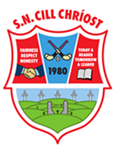Internet use draft
Internet Use Policy
School Name: Kilchreest National School
Address: Kilchreest, Co. Galway
The aim of this Acceptable Use Policy is to ensure that pupils will benefit from learning opportunities offered by the schools Internet resources in a safe and effective manner. Internet use and access is considered a school resource and privilege. There, if the school AUP is not adhered to this privilege will be withdrawn and appropriate sanctions as outlined in the AUP will be imposed.
It is envisaged that staff and Board of Management will revise the AUP regularly. Before signing, the AUP should be read carefully to indicate that the conditions of use are accepted and understood.
This version of the AUP was created on 3/12/2004 by staff and BOM of Kilchreest N.S.
Schools Strategy
The school will employ a number of strategies in order to maximise learning opportunities and reduce risks associated with the Internet. These strategies are as follows:
General:
- Internet sessions will always be supervised by a teacher
- Filtering software and/or equivalent systems will be used in order to minimise the risk of exposure to inappropriate material
- The teacher will regularly monitor pupils’ Internet usage (by checking search history)
- Uploading and downloading of non-approved software will not be permitted
- Virus protection will be used and updated on a regular basis
- The use of personal memory keys in school requires a teacher’s permission
- Students will observe good “netiquette” (ie etiquette on the internet) at all times and will not undertake any actions that may bring the school into disrepute.
World Wide Web.
- Students will not visit Internet sites that contain obscene, illegal, hateful or otherwise objectionable materials.
- Students will use the Internet for educational purposes only.
- Students are not allowed to access their personal social media sites in school.
- Students will never disclose or publicise personal information.
Students will be aware that any usage, including distributing or receiving information, school-related or personal, may be monitored for unusual activity, security and/or network management reasons.
Email.
- Students will use approved class email accounts under supervision by or permission from a teacher.
- Students will not send or receive any material that is illegal, obscene, defamatory or that is intended to annoy or intimidate another person.
- Students will not reveal their own or other people’s personal details, such as addresses or telephone numbers or pictures.
- Students will never arrange a face-to-face meeting with someone they only know through emails or the Internet within the school e-mail.
- Students will note that sending and receiving email attachments is subject to permission form their teacher.
Internet Chat.
- Students will only have access to chat rooms, discussion forums or other electronic communication forums that have been approved by the school.
- Chat rooms, discussion forums and other electronic communication forums will only be used for educational purposes and will always be supervised.
- Usernames will be used to avoid disclosure of identity.
- Face-to-face meetings with someone via internet chat will be forbidden.
School Website.
- Pupils will be given the opportunity to publish projects, artwork or school work on the World Wide Web. Pupils work will appear in an educational context on Web pages. Photographs, audio and video clips will endeavour to focus on group activities. Video clips may be password protected.
- The publication of student work will be co-ordinated by a teacher.
- Personal pupil information including home address and contact details will be omitted from school web pages.
- Any person who does not want their child or their child’s work to appear on the school website or use the internet must contact the school.
Legislation.
- Parents are encouraged to familiarise themselves with the following legislations:
- Date Protection (Amendment) Act 2003
- Child Trafficking and Pornography Act 1998
- Interception Act 1993
- Video Recordings Act 1989
- The Data Protection Act 1988
Misuse of the Internet may result in disciplinary action, including written warnings, withdrawal of access privileges and, in extreme cases, suspension or expulsion. The school also reserves the right to report any illegal activities to the appropriate authorities.
Personal Devices.
No personal devices are allowed in school
Although the school takes active steps to promote safe use of the Internet, it recognises the possibility that students may accidentally or deliberately access inappropriate or objectionable material.
Signed: _________________________________ Date: ____________________________
